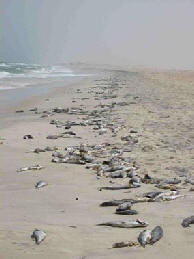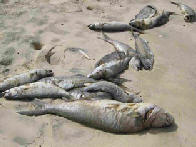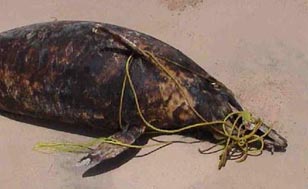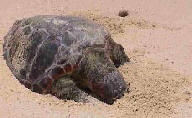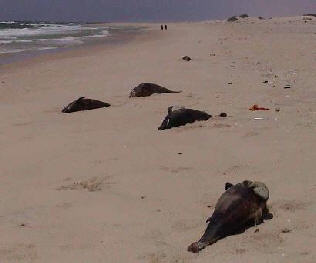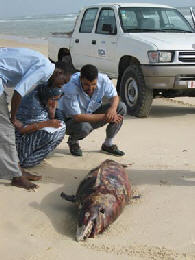|
Mauritanian bycatch causes mass deaths of dolphins and turtles
Posted - 20th August 2003
(IUCN)
20th June 2003
Southern coast of Mauritania, - The recent discovery on the beaches of Mauritania of more than 200 dolphins and turtles, some of which had clearly been killed by entanglement in fishing nets, fuels the need for urgent action to combat the world's growing bycatch problem.
A scientific mission of IUCN's Mauritania office found a total of 230 dead dolphins and at least one pilot whale, as well as hawksbill and leatherback turtles on the southern beaches of Mauritania (between Nouakchott, the capital, and Saint-Louis). He alerted the Mauritanian Institute of Oceanographic Research and Fisheries (IMROP) which is now carrying out an investigation into the mass mortality.
"Although the cause of death has not yet been confirmed, because of the mixture of species found and the fact that some were entangled in sections of fishing nets, it is likely that these animals were killed as bycatch. Unfortunately this is not the first such incident. Fishing bycatch events are regularly reported from the west coast of Africa and are having a disastrous effect on populations of marine species," said Dr Jean-Christophe Viť, Deputy Coordinator of IUCN's Species Programme.
Worldwide, both marine and freshwater cetacean (dolphins, whales and porpoises) populations are affected by the continued expansion of fishing effort including into previously unexploited areas, the rise in shipping traffic, increasing development along rivers, coasts and estuaries, and rising pollution.
The incident in Mauritania comes at a time when the issue of bycatch and its critical impact on marine life is gaining increasing global attention. The recently-released Cetacean Action Plan produced by IUCN's Species Survival Commission (SSC) states that of the barrage of threats facing the world's cetaceans, fishery bycatch is becoming increasingly serious and widespread. There is an urgent need to develop alternative fishing gear and practices, and implement immediate mitigation measures ranging from fishery closures to the mandatory use of acoustic deterrents to keep animals away from nets.
On Monday (16th) the International Whaling Commission (IWC) adopted the Berlin Initiative which expands the conservation activities of the Commission to address wider threats to cetaceans such as bycatch, ship strikes, and habitat destruction.
The report from Mauritania comes in the same week that IUCN and its partners announce the launch of a EUR 30 million strategy to protect West Africa's coasts and seas. Ten Ministers of Environment and Fisheries from Cape Verde, Gambia, Guinea, Guinea Bissau, Mauritania and Senegal have approved the new "Regional Strategy for Marine Protected Areas in West Africa". Approximately 60% of the 22 million people in the six countries of West Africa live on the coast and depend mostly on fisheries. As well as threatening biodiversity, overfishing threatens local livelihoods.
There is a widespread assumption that marine species are less vulnerable to extinction and severe depletion than their terrestrial counterparts. A growing body of scientific evidence is proving this to be untrue and SSC is working to build awareness amongst policy makers of the threat of extinction in marine species. Marine issues will also be central to the Vth IUCN World Parks Congress which takes place in South Africa in September. (IUCN)
Top
|
